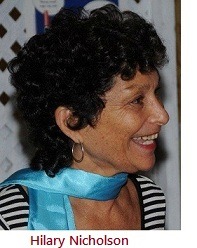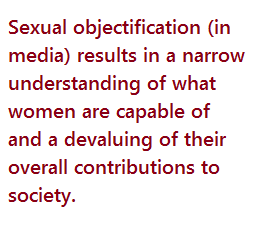 Media consumes so much of our lives in modern society, that what is represented in media – Film, Newspapers, Television, Internet – greatly influences how we interpret the world around us. But representations of women and the issues that most impact women’s lives are often dealt with in a limited and cursory manner and is grossly disproportional to the actual impact and contribution that women make to society. In the case of violence against women, what does actually make it to the airwaves are only the most gruesome and sensationalised stories which are treated more as a consumer product intended for titillation and shock value rather than an actual interrogation of the very serious issues of rape, intimate partner violence and political violence.
Media consumes so much of our lives in modern society, that what is represented in media – Film, Newspapers, Television, Internet – greatly influences how we interpret the world around us. But representations of women and the issues that most impact women’s lives are often dealt with in a limited and cursory manner and is grossly disproportional to the actual impact and contribution that women make to society. In the case of violence against women, what does actually make it to the airwaves are only the most gruesome and sensationalised stories which are treated more as a consumer product intended for titillation and shock value rather than an actual interrogation of the very serious issues of rape, intimate partner violence and political violence.
 Here, Georgia Love speaks with Hilary Nicholson – a founding member of Women’s Media Watch-Jamaica (WMW) about representations of women in the media and creating gender-aware media in the Caribbean. Hilary who has been Training Coordinator at WMW since 1998, was also one of the early members of Sistren Theatre Collective. As an actress and storyteller Hilary has used her unique style and energy to pioneer and build participatory learning techniques that utilize theatre-in-education for gender-awareness training in Jamaica and the Caribbean.
Here, Georgia Love speaks with Hilary Nicholson – a founding member of Women’s Media Watch-Jamaica (WMW) about representations of women in the media and creating gender-aware media in the Caribbean. Hilary who has been Training Coordinator at WMW since 1998, was also one of the early members of Sistren Theatre Collective. As an actress and storyteller Hilary has used her unique style and energy to pioneer and build participatory learning techniques that utilize theatre-in-education for gender-awareness training in Jamaica and the Caribbean.
What motivated you to be part of the group of women that started WMW?
I was part of Sistren Theatre Collective at the time and we were working with a larger group of women to look at research findings that would help us understand what was happening to women in society. We had to form smaller sub groups to look at the research, and the group I was in had a very good discussion where we identified a gap in analysis around women and media. Our subgroup decided to meet again and it was the brainstorming and exciting discussions that I had with women like Fae Ellington, Elaine Wint, Jennifer Brownell and a couple of others that prompted me. Out of that group and those very good discussions we gradually became Women’s Media Watch. So the women and media interest was there, because I had been working in film with Sistren and also did a couple films with the “Chris Blackwell outfit”. In a way the stars aligned with my film interest, my interest in women and the fact that I really liked what was happening and felt very comfortable with that group of women.
How much of WMW’s work is focused on reducing violence against women?
The Women’s Media Watch – Jamaica is an organisation which is committed to reducing gender-based violence by promoting gender equity and gender-aware media and communications. WMW’s work includes training and professional development seminars, media literacy, conflict resolution workshops, research, public education and advocacy.
I think the workshops, events and analysis that we share with women build self esteem and give a sense of empowerment which of course is a major step towards women being able to avoid gender based violence.
 Identify two kinds of harm you think media causes women?
Identify two kinds of harm you think media causes women?
Sexual objectification is an obvious and prevalent one that results in a narrow understanding of what women are capable of and a devaluing of their overall contributions to society. Sexual objectification leaves women vulnerable to violence. Think about it, if someone is objectified, their humanity and autonomy don’t matter, anyone is free to exert power over them and any violation against them can be justified. That happens a lot in entertainment media. The other side is with news media, and the Global Media Monitoring Project provides data that shows us that women are seriously underrepresented in news and when they do show up it’s not in ways that illustrate the complexity of their lives. So yes, for example Portia Simpson-Miller, as the leader of a national political party, will get a certain kind and level of coverage but everyday women’s lives and experiences often end up being ghettoized in traditional news coverage. That ghettoization also extends to gender based violence that still doesn’t receive the thorough gender-aware journalistic treatment that it should.
Describe an eye opening/powerful/memorable experience where you’ve seen media effectively used to advance women’s rights
Over the last 30 years I’ve come across radio/news programmes done by women’s groups in Africa that I’ve found amazing! Programmes produced by women, listened to widely and I’ve thought “we haven’t done anything like that in the Caribbean!” But there is still a lot that we’ve done, like some earlier commemoration events for victims of violence for International Day for the Elimination of Violence Against Women that incorporated dramatic elements that were covered by the media. Also, WMW’s “Real Men Don’t Abuse Women” sticker is small but has been very impactful and it makes people stop and think. It’s an alternative media product that has travelled widely around the Caribbean and way beyond.
Generally, with all the advances in media and communications technologies do you personally feel more empowered in your work or does it feel like more to learn, more to do, more to struggle against?
My feelings of empowerment don’t come from the technology. I’ve still got sooo much to learn! Rather, my feelings of empowerment come more from the wisdom of old age (LOL). I feel far more knowledgeable about the whole area of women and media, and I can see the reasons behind things more quickly, and can talk about them at the spur of the moment. But in terms of the new media landscape I feel very challenged and want to make more time to learn. I recognize that new media offers huge opportunities and I want to learn how to make better use of those opportunities.
What would you love to see more of in Caribbean media to help the push for gender equality?
We need to see far more gender analysis of all issues, the big topics, not just topics that are obviously gendered. Whether it is what IMF and IMF conditionalities mean, campaign financing, issues of employment and unemployment, the feminization of poverty and the feminization of HIV/AIDS. All these things need to be addressed more by “gender experts” and seen and heard more in media.
